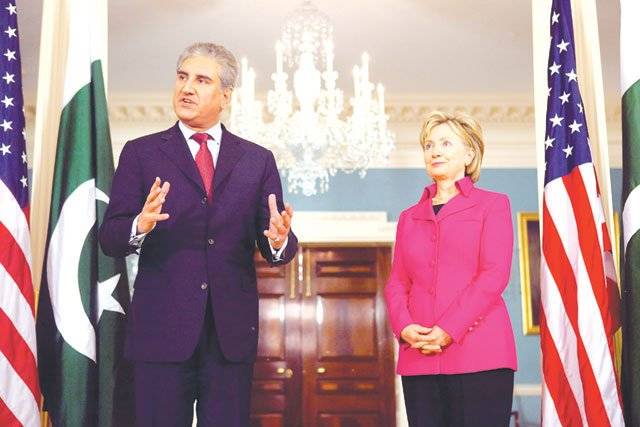WASHINGTON - Putting terrorists on notice, US President Barack Obama on Tuesday night pledged to eliminate al-Qaeda from "safe havens" along the Pak-Afghan border. "With our friends and allies, we will forge a new and comprehensive strategy for Afghanistan and Pakistan to defeat al-Qaeda and combat extremism," Obama said in his maiden address to the joint session of the US Congress. "I will not allow terrorists to plot against the American people from safe havens half a world away," he said in a stern tone. "We will not allow it." The Obama administration this week is also holding three-way talks with foreign ministers of Afghanistan and Pakistan, hoping to chart out a new strategy to fight extremists in the region. Obama has pledged to send another 17,000 troops to Afghanistan as the United States winds down its controversial troop presence in Iraq. "I will soon announce a way forward in Iraq that leaves Iraq to its people and responsibly ends this war", he said. Obama's first major address to Congress Tuesday night centred largely on the bleak economic conditions facing the country and offered little substance on foreign policy. Since taking office in January, Obama has made tackling the recession his top priority as his administration reviews policies on key international issues like the wars in Iraq and Afghanistan and curtailing Iranian and North Korean nuclear aspirations. The new president has moved quickly to take up the issues, appointing special envoys for the Israeli-Palestinian peace process, the Persian Gulf, and Afghanistan-Pakistan, but has not outlined how he intends to move forward on the critical issues. Secretary of State Hillary Rodham Clinton returned just days ago from East Asia, her first trip abroad that included stops in Japan, Indonesia, South Korea and China and sent a signal that the region has emerged as a key focus of Obama's foreign policy. Obama's biggest national security move early in his presidency has been ordering the closure of the notorious detention centre for suspects in the war on terrorism in Guantanamo Bay, Cuba. Obama said shuttering the facility that has been the source of torture allegations is intended to restore American values and moral leadership in the world. "Living our values doesn't make us weaker, it makes us safer and it makes us stronger," Obama said. "And that is why I can stand here tonight and say without exception or equivocation that the United States of America does not torture. "But Obama made it clear in the hour-long speech that he intends to take a new approach to international affairs after eight years of the Bush administration's unpopular foreign policies. "We are showing the world that a new era of engagement has begun. For we know that America cannot meet the threats of this century alone, but the world cannot meet them without America," Obama said. "We cannot shun the negotiating table, nor ignore the foes or forces that could do us harm. We are instead called to move forward with the sense of confidence and candour that serious times demand." Obama said he will strengthen alliances and seek new ones throughout the world, while emphasising the importance of negotiations to resolve differences. He intends to draw down the US presence in Iraq and shift the effort to Afghanistan, which has grown increasingly unstable amid a rapidly deteriorating security environment. The president did not specifically mention the international efforts to prevent Iran from acquiring nuclear weapons and persuade North Korea to abandon its atomic programme, but pledged to meet the challenge posed by nuclear proliferation. During the campaign, Obama said he would open or expand dialogue with traditional US foes like Iran, North Korea and Cuba, but has so far not outlined any plans to do so. The State Department announced Monday the appointment of Dennis Ross, a Middle East expert, as a special envoy for the Persian Gulf region. Ross is expected to help oversee US policy towards Iran. Shortly after taking office, Obama appointed former senator George Mitchell as envoy for the Israeli-Palestinian peace process, and diplomat Richard Holbrooke as his special representative for Afghanistan and Pakistan.
Sunday, May 19, 2024
Obama vows comprehensive Pakistan-Afghanistan strategy

China to see mild growth in consumer inflation
May 19, 2024
Court awards life imprisonment to drug dealer
May 19, 2024
Lyallpur Museum celebrates International Museum Day
May 19, 2024
Crime eradication police responsibility: IGP
May 19, 2024
Confrontational Politics
May 19, 2024
Sports & Genocide
May 18, 2024
Healing AJK
May 18, 2024
A New World Order
May 18, 2024
Tobacco Toll
May 17, 2024
Unsung Heroes of Society
May 19, 2024
Water Shortage in Our Area
May 19, 2024
The AI Trap
May 19, 2024
Continuing Narrative of Nakba
May 18, 2024
Teacher Struggles
May 18, 2024
ePaper - Nawaiwaqt
Advertisement
Nawaiwaqt Group | Copyright © 2024





